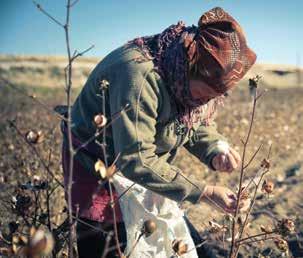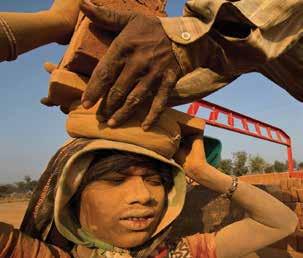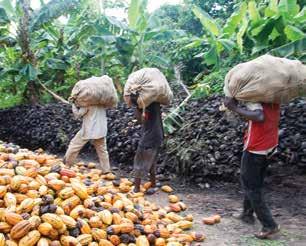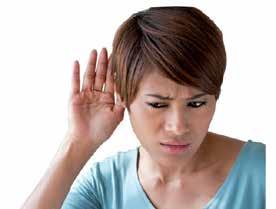
6 minute read
Feature
Modern slavery on our doorstep
It’s easy to think that slavery is a thing of the past but, sadly nothing could be further from the truth.
Advertisement
Centuries after slavery was officially abolished, thousands of people are still being exploited and sold as slaves from Asia to Australia and Europe to the Americas - even here in the UK right on our own doorsteps. In fact, without realising you probably see people trapped in slavery on a regular basis. It might be someone working in a private home on your street, the man working in the car wash in town, or the cleaner who empties your office bin every night. It can be difficult to spot the signs. Modern slavery in the UK can take many forms, including forced sexual exploitation, domestic slavery or forced labour on farms, in construction, shops, bars, nail bars, car washes or manufacturing. The number of people identified as victims of modern slavery has been rising year on year. According to the Global Slavery Index it is thought there are up to 136,000 victims of modern slavery in the UK. So how do people get trapped in slavery?
According to the world’s oldest international human rights organisation, British based Anti-Slavery International, vulnerable people often take big risks in order to provide for their families. Typically, they can be offered an apparently good job in the UK. Often they take a loan from the traffickers in advance. However, when they arrive in the UK, the situation is completely different. Their passport might be taken away and they’re told they need to pay off the debt before they can leave. Violence and threats are common. They are trapped here with no possessions, no means to return and totally reliant on their traffickers. Vulnerable British people are also targeted, especially children from disadvantaged backgrounds, to be groomed into drug criminal gangs in so-called ‘county lines’ trafficking. A prime example of how slavery can exist in plain sight is the case of the Rooney family who ran a slave ring right under the noses of a UK town in Lincolnshire. By taking advantage of vulnerable populations such as the homeless, the elderly, and the mentally ill, the Rooney family slave ring managed to run under the radar for over two decades, netting the family a huge profit while sending their victims through unspeakable injustices. In all, 11 Rooney family members ended up in prison. These horrific crimes have even inspired recent episodes of Radio 4’s The Archers which has helped to raise awareness of the evil pervasiveness of modern slavery.

For the police, modern slavery and human trafficking is a challenging crime to investigate. The complexity of cases, the variety of crimes, the multi-national and multi-ethnic background of participants, the multiple occurrences of abuse, the different forms of deception and coercion used to control victims and the way offences are interwoven with other forms of criminality, sets modern slavery apart. This led to the Modern Slavery Police Transformation Programme being set up in 2017 to help support and train the police in how best to tackle this problem and share intelligence both regionally and nationally. In fact, Devon & Cornwall’s Chief Constable Shaun Sawyer is the police lead for the Modern Slavery and Organised Immigration Crime Unit, based in Exmouth. Last year they unveiled new figures showing that despite Covid, investigations into modern slavery-related offences were at their highest ever level. More than 2,000 cases were live in September alone.

Forced labour in cotton industry, Uzbekistan - image by Simon Buxton for Anti-Slavery International Bonded labour, India - image by Bharat Patel for Anti-Slavery International

“Modern slavery and trafficking are cruel crimes that see perpetrators target some of the most vulnerable people in our society. Perpetrators range from international and national serious and organised crime networks, through to single individual exploitative relationships. This is arguably the most pernicious crime type of our generation,” says Chief Constable Sawyer.
Throughout the UK, many different organisations are working alongside Anti-Slavery International to prevent slavery, promote identification of victims, provide support services to survivors, and ensure that slavery cannot flourish. The Salvation Army has its own anti trafficking and modern slavery unit providing specialist support to all adult victims of modern slavery in England and Wales via safehouses or through outreach support. ECPAT UK is a leading children’s rights organisation working to protect children from trafficking and slavery. Bristol-based Unseen provides safehouses and community outreach, as well as running the modern slavery and exploitation helpline, 08000 121 700. Hope for Justice works in the UK and internationally, helping to rescue trafficking victims, assist in aftercare, hold traffickers accountable, and campaign on a wider level to improve awareness and legislation. The Rotary Action Group Against Slavery has been working both internationally and in the UK, helping to raise awareness in the community and fund anti-slavery charities while working alongside them to protect the vulnerable from slavery and its consequences. 75-year-old Rotarian Simon John, is embarking on a 1,000-mile Freedom Ride, a speaking/cycling tour from Land’s End to John O’Groats to raise awareness of human trafficking and modern slavery. The ride is a homage to abolitionist Thomas Clarkson who in 1791 rode on horseback to towns across Britain, raising awareness of the horrors and suffering in the transatlantic slave trade and, raising support for the 19th century antislavery campaign. Little did Clarkson realise that 230 years later, the horror of slavery would still be with us.
Geri Parlby Rotary Club of Tavistock Rotary Action Group Against Slavery
For more information please visit antislavery.org; salvationarmy.org.uk/modern-slavery; ecpat.org.uk; unseenuk. org; hopeforjustice.org; ragas.online.

You are only a phone call away from changing your life
Private Hearing Aids
Private hearing aids care allows people to get the help they need immediately locally based with no waiting lists or restrictions on the type of hearing aid you are able to receive.
NHS Hearing Aids
Accredited by the NHS. Locally based, no need to go to hospital, ask your GP to be referred.
Ear Wax Removal

Instant effect, your hearing will be clearer and brighter. No mess procedure and no need to pre-oil your ears.

Book Your Appointment Now 01822 617883











